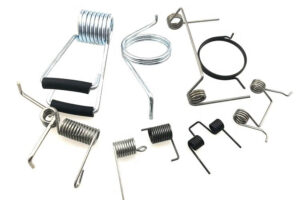Spiral Torsion Springs

Springs are an essential component in many mechanical devices, from watches to cars. One type of spring that is often overlooked but plays a crucial role in many applications is the spiral torsion spring.
What are Spiral Torsion Springs?
They are a type of spring that works by twisting or winding. They are made from a single piece of wire that is coiled tightly into a spiral shape. When the spring is twisted, it stores energy, which is released when the spring is allowed to unwind. This makes spiral torsion springs ideal for applications where a constant torque or rotational force is required.
Uses of Spiral Torsion Springs:
They have a wide range of uses in various industries. One of the most common applications is in watches and clocks, where they are used to power the movement of the hands. They are also used in door hinges, where they provide the necessary torque to keep the door closed. In the automotive industry, they are used in suspension systems to provide a smooth ride and absorb shocks.
Advantages of Spiral Torsion Springs:
One of the main advantages of spiral torsion springs is their ability to provide a constant torque or rotational force. This makes them ideal for applications where a consistent level of force is required. They are also very durable and can withstand high levels of stress and strain without losing their shape or strength. Additionally, they are very compact and can be designed to fit into small spaces, making them ideal for use in watches and other small devices.
Design Considerations:
When designing spiral torsion springs, there are several factors that need to be taken into consideration. The first is the material used to make the spring. The most common materials are steel and stainless steel, but other materials such as titanium and nickel alloys can also be used. The diameter and length of the wire used to make the spring also need to be considered, as this will affect the strength and flexibility of the spring. Finally, the number of coils and the pitch of the spiral need to be carefully calculated to ensure that the spring provides the necessary torque or rotational force.
Torsion Spring Manufacturer
|
Material
|
Carbon steel(SWC), Alloy steel, SEA9260/ 9254/ 6150/ SUP9/ SUP10/ SUP12 /, 51CrV4, stainless steel, music wire/piano
wire(SWP);beryllium copper etc. |
|
Wire diameter or thickness
|
0.2~85mm
|
|
Finish
|
Zinc, Chorme, Nickel, Silver, Gold, Tin, Powder coating, Oxide black or customized
|
|
Processing Craft
|
Material purchased-Producing-First testing-Coiling-Inspection-Heat treatment-Cleaning-Surface treatment-Final testing-Packing-Shipping
|
|
Application
|
Industrial/ auto/ Motorcycle/ electronics/ electric power/ Toys/ Sports/ Machinery equipment etc.
|
|
Springs
|
|
|
Quality certification
|
IATF 16949:2016, ISO 14001:2015, ISO9001:2015, OHSAS 18001:2007
|
Conclusion:
Spiral torsion springs may not be as well-known as other types of springs, but they play a crucial role in many mechanical devices. Their ability to provide a constant torque or rotational force makes them ideal for a wide range of applications, from watches to cars. When designing this kind of springs, it is important to consider factors such as the material used, the diameter and length of the wire, and the number of coils and pitch of the spiral. With careful design and manufacturing, it can provide reliable and durable performance for many years.






